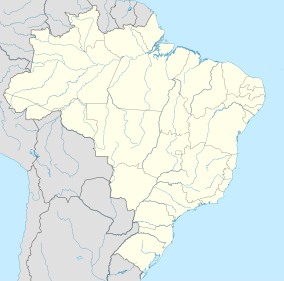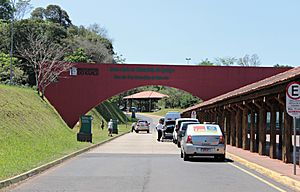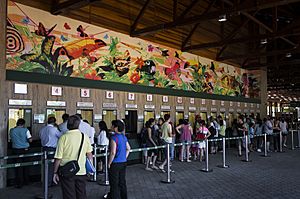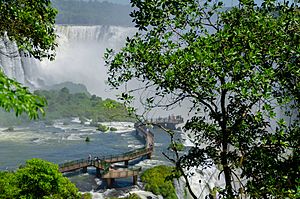Iguaçu National Park facts for kids
Quick facts for kids Iguaçu National Park |
|
|---|---|
|
IUCN Category II (National Park)
|
|
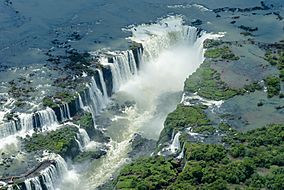
|
|
| Location | Paraná State, Brazil |
| Area | 1,700 km2 (660 sq mi) |
| Established | 10 January 1939 |
| Type: | Natural |
| Criteria: | vii, x |
| Designated: | 1986 (10th session) |
| Reference #: | 355 |
| Region: | Latin America and the Caribbean |
| Endangered: | 1999–2001 |
Iguaçu National Park is a huge nature park in Paraná State, Brazil. It covers about 185,262.5 hectares (457,794 acres) of land. The park is famous for its amazing Iguazu Falls, which are some of the biggest waterfalls in the world!
The park was created on January 10, 1939. In 1986, UNESCO named it a UNESCO World Heritage Site. This means it's a very special place that needs to be protected for everyone. The park is managed by a group called Chico Mendes Institute for Biodiversity Conservation (ICMBio).
Iguaçu National Park shares a border with Iguazú National Park in Argentina. Together, these two parks protect a huge area of nature. The waterfalls stretch over 2,700 meters (8,900 ft). This park is home to many rare and endangered species of plants and animals. You might find a giant otter or a giant anteater here! The misty air from the waterfalls helps lots of green plants grow.
Contents
History of Iguaçu Park
The Iguaçu National Park gets its name from the Iguazu River. A big part of this river, about 50 square kilometres (19 sq mi), forms the incredible Iguaçu Falls.
This park is very important for the Prata Basin area. It protects many different kinds of animals and plants. It was the first park in Brazil to have a special plan to manage and protect its nature.
The main goal of the park is to keep its beautiful natural areas safe. This allows scientists to study the plants and animals. It also helps people learn about nature and enjoy the outdoors.
The idea for Iguaçu National Park started a long time ago. In 1876, an engineer named André Rebouças suggested protecting the Iguaçu Falls. He wanted to save this amazing place for future generations. This was only four years after Yellowstone National Park, the world's first national park, was created.
On November 17, 1986, Iguaçu National Park was officially listed as a Natural Heritage of Humanity by UNESCO. It is one of the largest protected forest areas in South America.
Where is Iguaçu National Park?
In Brazil, the park is located in the western part of the state of Paraná. It is about 17 km (11 mi) from the city of Foz do Iguaçú.
The park borders Argentina, where the Iguazu National Park is located. The Iguaçú River forms the border between these two countries and their parks. The river starts near the Serra do Mar mountains and flows for 18 km (11 mi) through Paraná.
The Iguaçú River then flows into the Paraná River. This meeting point of rivers creates a special border area. It is where Brazil, Argentina, and Paraguay all meet!
Visiting Iguaçu National Park
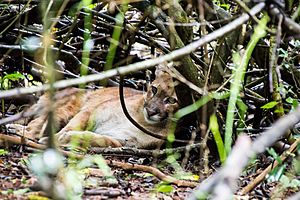
Only a small part of the park, about 0.3% of its total area, is open for visitors. But this small part holds the most amazing sights!
The most spectacular part of the park is the Iguaçú Falls. These waterfalls form a huge semicircle, about 2,700 metres (8,900 ft) wide. The water crashes down from a height of 72 metres (236 ft). The number of waterfalls can change from 150 to 300, depending on how much water is in the Iguaçú River.
Besides the incredible waterfalls, there are other cool things to see. You can visit the Poço Preto (the Black Well) or the Macuco Waterfall. There's also a Visitors Center where you can learn more. You might see the Santos Dumont Statue, which honors the "Father of Aviation." He helped make the falls area a national park.
In 2014, over 1.5 million people visited Iguaçu National Park. It's a truly popular and amazing place to explore!
See also
 In Spanish: Parque nacional del Iguazú para niños
In Spanish: Parque nacional del Iguazú para niños
- Iguazu Falls
- Wildlife of Brazil
 | Victor J. Glover |
 | Yvonne Cagle |
 | Jeanette Epps |
 | Bernard A. Harris Jr. |


